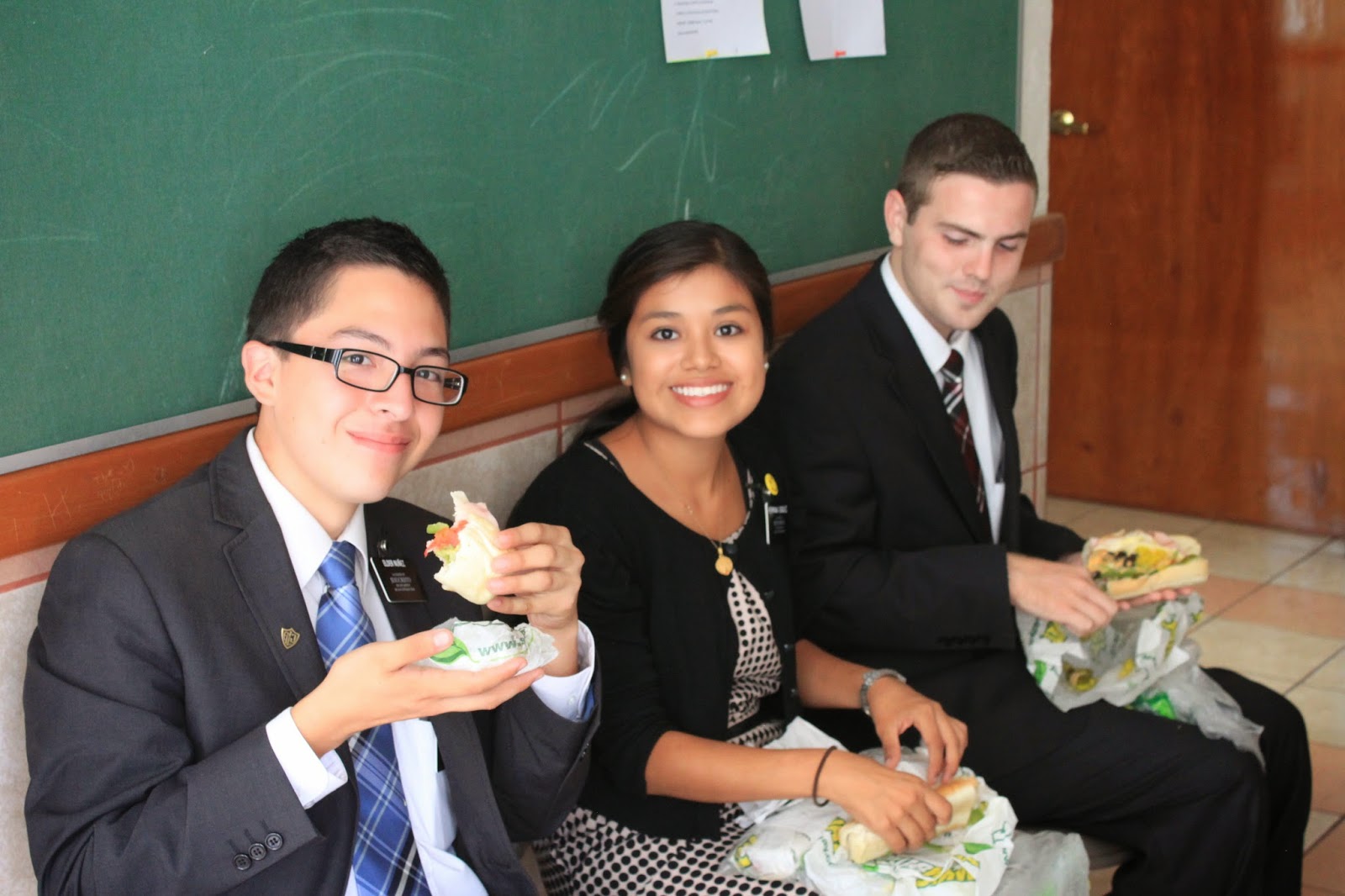Each year we have the honor of touring the mission with a General Authority. This was our third and last mission tour and we felt so very blessed that all three have been wonderful experiences.
This year we had the privilege of touring with Elder and Sister Pieper of the Quorum of the Seventy. Elder Pieper served his mission in Mexico and Sister Pieper lived in both Uruguay and Ecuador as a child and so both have a great love for the Latin people. Elder Pieper is currently serving in our Area Presidency.
We met in three different meetings in three different cities with 3-4 zones in each, over the course of three days. We have 234 missionaries and appreciate that they took the time to get to know and shake hands with each of them.
Elder Pieper also spent several hours training us on how to be more effective missionaries. Much of his training came directly from the Mission President's Seminar this summer in Provo and was very inspiring.
Following the training we fed everyone a Subway sandwich since they all would miss their meals with members that day and some had traveled several hours to be with us. While eating I was able to sneak a few pictures of the missionaries.
Elder Pieper also asked to visit with about 10-12 missionaries from each group so that was arranged. Here a few of the missionaries are waiting for their opportunity to visit with him. What a sweet blessing that was!
After quickly eating, it was time to load up the vans and head back to work.
We learned a lot during our training. A few of the principles he taught are:
1. Understand your purpose. In order to be an effective missionary you need to understand what it means to have Faith in Jesus Christ, what true repentance is, the importance of the baptismal covenant, why we need to have the Holy Ghost and what it means to endure to the end. And that "end" means exaltation, not just the end of this life.
3. Help your investigators participate in their own learning experience by asking questions and then looking for the answers. Teach them how to find the answers in the scriptures.
4. Help your investigators understand what you are teaching (as well as find answers to your own questions) by first understanding the "what". What is the doctrine behind the teaching. Next look for the "why" or the principles that support the doctrine. Lastly help them personally apply the teaching by helping them see "how" they can apply the principles in their own personal lives.
Just as Elder Packer has always said, "True doctrine changes behavior" and no one's behavior will change until they understand the doctrine.
Therefore when we are trying to help someone progress on the covenant path we should ask ourselves, "What is the doctrine they don't understand that is keeping them from progressing?" And then help them to learn, understand and live according to that doctrine.
5. Another very important teaching we learned is how to use D&C 20:37 in helping investigators choose to be baptized. No matter why the investigator may be reluctant to move forward toward baptism, (feel they have already been baptized, not sure they want to be baptized or don't feel ready) we can help them better understand the need for a baptism by someone in authority for the remission of sins, by having the person read this verse themselves and ponder how they can apply the verse to their lives--and then help them do this.
For example if the person doesn't feel they are yet ready, the verse can help them understand what they need to do to get ready. If they feel they already have had a baptism, they can read the requirements the Lord has set for baptism to see if their previous baptism met the requirements.
#6. He taught from D&C 84 the difference between priesthood authority (which righteous men hold) and priesthood power which is available to all worthy members of the Church through covenants--regardless of gender.
On Saturday, following our three main meetings, we met with our mission council. Once again Elder Pieper counseled us on how we can improve missionary work. And some of this counsel was given to individual missionaries, as well as to the group. (How awesome is that to have a General Authority personally explain a scripture to you!)
As we were at the temple there were a lot of people outside waiting to get into sessions. Elder Pieper very graciously went and visited with many of them as well.
It was a wonderful week filled with many blessings. We are so grateful to Elder and Sister Pieper for their friendship, guidance and counsel. And so grateful for our missionaries who all behaved perfectly and reverently at every meeting. We are so proud of you all!!

























Just wanted to tell you I love hearing about your experiences. Thanks for sharing the things you learned from Elder Pieper. I was thinking as I read about how I could apply them to parenting.
ReplyDelete